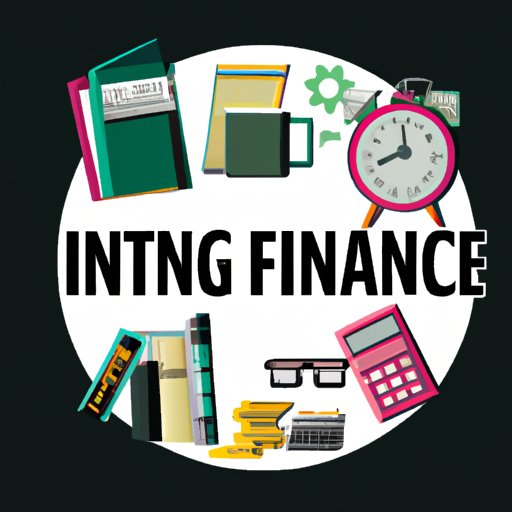Introduction
When it comes to managing money, many people feel overwhelmed or intimidated. After all, understanding the basics of finance can be complicated and time-consuming. But becoming financially literate is an important step in achieving financial security and independence. Learning about finance can help you make smart decisions about investing, budgeting, and saving for the future.
The good news is, there are numerous ways to learn about finance. From reading books and taking courses to attending seminars and following financial experts on social media, there’s something out there for everyone. Below are 8 steps to help you get started on the path to financial literacy.
Read Books or Online Articles on Personal Finance Topics
One of the best ways to learn about finance is to read books or online articles on the subject. There are countless personal finance books available, written by authors who have studied the subject extensively. These books can provide valuable information on topics such as budgeting, investing, debt management, and more.
In addition to books, there are plenty of helpful online resources that can teach you about finance. Websites such as Investopedia and The Balance offer comprehensive guides to various aspects of personal finance. And if you’re looking for quick tips and advice, blogs like MagnifyMoney provide useful insights.

Take a Personal Finance Course at a Local College or University
Taking a course at a local college or university is another great way to learn about finance. Most institutions offer courses that cover topics such as budgeting, investing, retirement planning, and more. Taking a course can give you a deeper understanding of the subject, as well as the opportunity to ask questions and receive feedback from instructors.
In addition to traditional classroom courses, many colleges and universities now offer online courses in personal finance. Online courses are often more convenient and flexible than traditional courses, and can be a great option for those with busy schedules.

Follow Financial Experts on Social Media for Advice and Tips
Following financial experts on social media is a great way to stay up to date on the latest news and trends in the world of finance. Many of these experts share helpful tips and advice on a variety of topics, including budgeting, investing, taxes, and more. You can also use social media to connect with other people who are interested in personal finance, which can be a great source of support and motivation.
Some of the top financial experts to follow on social media include Robert Kiyosaki (@theRealKiyosaki), Dave Ramsey (@DaveRamsey), Suze Orman (@SuzeOrman), and Tony Robbins (@TonyRobbins).

Attend Local Seminars and Workshops on Financial Planning
Attending a seminar or workshop on financial planning can provide a wealth of information on various topics related to personal finance. These events often feature experts in the field who provide valuable insights into budgeting, investing, taxes, and more. Additionally, many seminars and workshops offer hands-on activities that can help you apply what you’ve learned in a practical setting.
You can find local seminars and workshops on financial planning by checking your city’s event calendar or searching online. Organizations such as the Financial Planning Association (FPA) and the National Endowment for Financial Education (NEFE) often host events that are open to the public.
Ask Family and Friends for Their Recommendations on Financial Professionals
If you need help navigating the world of finance, asking family and friends for their recommendations on financial professionals can be a great place to start. These people may be able to recommend accountants, financial advisors, or other professionals who can provide guidance on budgeting, investing, taxes, and more.
It’s important to do your own research when selecting a financial professional. Ask for referrals from people you trust, then check references, read reviews, and compare fees before making a decision.

Research Different Types of Investments and Decide Which Ones are Best for You
Once you have a basic understanding of personal finance, it’s time to start thinking about investing. Researching different types of investments can help you determine which ones are best suited to your needs and goals. Consider factors such as risk tolerance, investment timeline, and expected returns when making your decisions.
Common types of investments include stocks, bonds, mutual funds, exchange-traded funds (ETFs), and real estate. Before investing, it’s important to understand the risks and rewards associated with each type of investment.
Listen to Podcasts About Financial Planning and Investing
Listening to podcasts about financial planning and investing can be a great way to stay informed and motivated. There are plenty of podcasts available that discuss topics such as budgeting, investing, debt management, and more. Listening to these podcasts can help you gain a better understanding of the subject and keep you up to date on the latest news and trends.
Popular podcasts about financial planning and investing include Afford Anything, ChooseFI, and BiggerPockets Money Show.
Conclusion
Learning about finance can be intimidating, but it doesn’t have to be. With the right resources and guidance, anyone can become financially literate. By following the steps outlined above, you can take the first steps towards becoming financially savvy.
Start by reading books and online articles, then take a course at a local college or university if you need more in-depth knowledge. Follow financial experts on social media for advice and tips, attend seminars and workshops in your area, and ask family and friends for their recommendations on financial professionals. Finally, research different types of investments and listen to podcasts about financial planning and investing.
By taking these steps, you’ll be well on your way to becoming financially literate and achieving financial security and independence.
(Note: Is this article not meeting your expectations? Do you have knowledge or insights to share? Unlock new opportunities and expand your reach by joining our authors team. Click Registration to join us and share your expertise with our readers.)
